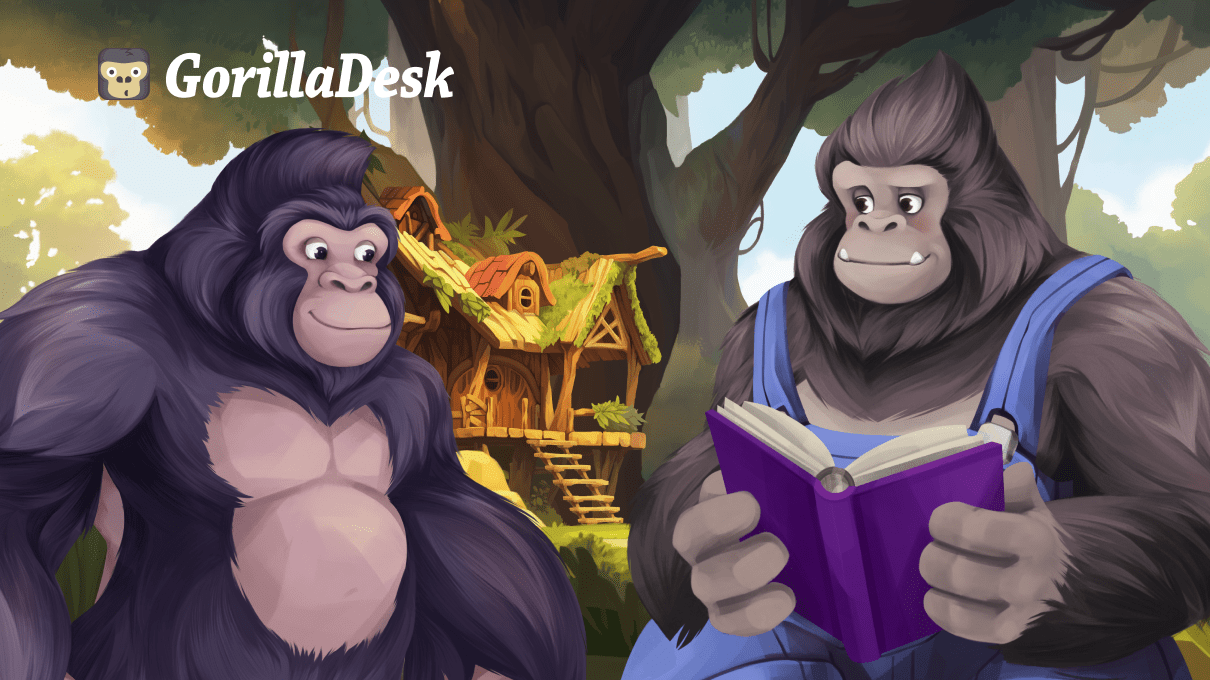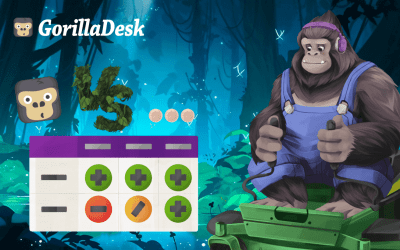Pest control estimates: How much do pest control services cost?
GorillaDesk Staff

Estimating services is a part of the pest control business, and it’s not something you’re going to get around. That’s why you need a streamlined process for coming up with pest control estimates that help you stay competitive and win more jobs while also prioritizing profitability.
In this article, we’ll explore how to implement dynamic, custom quotes to win more jobs and drive more revenue.
How to estimate pest control costs
Let’s walk through these four steps together. Then we’ll explore how to make the process easier by using GorillaDesk’s Dynamic Estimates feature and Estimate Packages, which allows you to customize quotes and ease decision-making for your customers, respectively.
Remember, the goal is to come up with estimates that balance two goals:
- Maximizing profit margins
- Staying competitive and winning jobs
Creating accurate pest control estimates involves four key steps.
1. Estimate the cost of materials
The cost of the pest control materials you’ll need depends on the type of pests you’re treating, the size and severity of the infestation, and the methods you’ll use. Eliminating termites, for example, will require a different approach than treating an ant infestation.
You’ll first need to scope out the job — an inspection visit is the best way to do this accurately — and then determine what materials you’ll need.
You can break down material costs into two categories:
- Insecticides: Insecticides tend to cost between $5 and $20 per bottle. The number of bottles required depends on the pest type and the size of the infestations. Specialized chemicals, pesticides, and sprays for pests like bed bugs and termites lean toward the more expensive end of the spectrum.
- Equipment: If this is your first pest control job (or your first time dealing with a specific pest), you may need to invest in equipment like sprayers, foggers, traps, or bait stations. Equipment is usually a one-time purchase in the range of $100 to $500, but you can use them across several jobs.
Pro tip
GorillaDesk’s estimating software can help you more accurately estimate the cost of materials by giving you insight into the historical costs of real jobs you’ve already completed. This can help you avoid underestimating services and harming profitability.
2. Estimate the cost of labor
Your labor costs will depend on the complexity of the job and how long it will take as well as the rates you pay yourself and your team.
The initial inspection you completed in the previous stage should help you determine the scope of the job. From there, it’s a simple calculation:
Labor costs = Required labor hours x hourly rate
For example, if you charge an hourly rate of $75, you’d calculate the labor for a three-hour pest control job as 3 x $75 = $225.
3. Estimate overhead costs
Calculate the indirect expenses associated with the job such as vehicle maintenance and insurance.
These expenses don’t relate directly to the pest control job at hand, and some of them you’ve already paid for as part of the cost of setting up a pest control business. However, they’re still real business expenses that you need to pay for and that you need to include in your cost estimates.
A good formula for estimating overhead costs per job is:
Overhead for job = (Monthly overhead ÷ billable hours) x job duration
Let’s say, for instance, that your total monthly overhead costs are $6,000 and that, in an average month, you bill 1,000 hours. Your overhead cost per hour would be $6. Then you just need to multiply that by the number of hours the job requires. If it’s a 10-hour job, for example, then your overhead for the job would be $60 ($6 x 10 hours).
4. Add up your costs and include markup
Now that you’ve calculated your material, labor, and overhead costs for the job, you’ll simply add them up to determine the total cost for the job. This is your break-even number. Charge any less, and you’ll lose money. Charge more, and you’ll make a profit.
The key is to determine how much profit you can make while staying competitive. A typical profit margin for pest control work is 20% – 30%, though your own margins may vary.
Let’s say you’ve scoped out a rodent extermination job as such:
- Materials: $100
- Labor: $180
- Overhead: $21
Your total job cost would be $301 ($100 + $180 + $21). Applying a markup of 25% results in an estimate of $376.25.
You might wish to round that up to $380, as round numbers can simplify the decision-making process, making it easier for your client to say yes.
Win more jobs with GorillaDesk’s Dynamic Estimates and Estimate Packages
Pest control service providers often include optional add-ons to their estimates to increase revenue and customer satisfaction. You can easily do the same while making it easier to get a “yes” with GorillaDesk’s Dynamic Estimates feature.
GorillaDesk’s Dynamic Estimates feature (Source)
With a Dynamic Estimate, you can provide the core quote as a required service. Below this core service, you can include recommended and optional services. The customer can check a box to add the service to their quote and see instantly how it impacts their investment and total estimated amount.
This is a great way to add an up-sell opportunity to increase your revenue. You don’t even need to put the hard sell on your customer. Just by asking the question, you’ll get a percentage of positive responses.
Our Estimate Packages feature can lower your customers’ cognitive effort, making it easier for them to give you a “yes.”
GorillaDesk’s Estimate Packages feature (Source)
Here, you simply bundle services together into a comprehensive package. Your customer chooses their desired package, then accepts the estimate and pays a deposit via GorillaDesk to lock in the job.
Pest control cost overview
There are a lot of factors that inform pest control prices.
Spiders, for example, tend to cost between $100 to $200 to exterminate, while bed bugs can cost up to $5,000 to treat.
Square footage plays a large part, too. A 500-square-foot home costs around $150 to $200 to treat for ants, while a 4,000-square-foot property can run as high as $500.
Below, we’ll dive into more details on what factors to bear in mind when creating pest control estimates.
Pest control costs by service type
The type and frequency of service you’re offering have an impact on what you charge.
There are some major differences between the cost of one-off and recurring pest control service packages.
One-time pest control visits
One-time pest control visits usually cost between $100 and $600, depending on the type of pest and the severity of the infestation. A one-time treatment by a professional exterminator for a severe infestation could cost as much as $5,000 or more, especially if fumigation is involved, which some severe termite infestations may require.
Some pest control service providers also charge an initial inspection fee in the range of $50 to $150, though many waive this cost if the customer goes ahead with the quote. Others offer free inspections as a way to get more business.
Monthly and annual pest control plans
Repeat work (like hospitality rodent prevention plans) often includes a discount in exchange for a fixed-term contract.
The average cost for ongoing pest control plans like this ranges from $300 to $900 annually.
Costs by pest type
The type of pest infestation you’re talking about greatly influences the cost of pest control.
Here are some common cost ranges for different kinds of pest problems:
| Pest issue | Cost range |
| Ants | $100 to $500 |
| Bed bugs | $300 to $5,000 |
| Bees | $95 to $1,500 |
| Cockroaches | $100 to $400 |
| Fleas | $75 to $400 |
| Lice | $50 to $200 |
| Mosquitoes | $100 to $500 |
| Moths | $150 to $300 |
| Rodents | $150 to $500 |
| Scorpions | $50 to $300 |
| Silverfish | $100 to $450 |
| Spiders | $100 to $200 |
| Termites | $2,000 to $8,000 |
| Ticks | $150 to $500 |
| Wasps | $100 to $1,300 |
Factors that affect pest control estimates
There are three main factors that impact the cost of pest control treatments:
1. Type and severity of infestation
The type and severity of the infestation play a major part in determining the cost of professional pest control services.
You can often resolve simple issues — a wasp nest, for instance — in the initial visit. But more severe infestations may require a more intensive treatment plan that involves multiple visits. This is one of the main reasons why termite treatment costs can be so high as termite infestations can be incredibly severe.
The type of pest involved also impacts exterminator costs. Common pests like roaches and carpenter ants tend to be cheaper to treat as professional pest control companies are well-equipped to deal with them in a one-time visit. Less common critters like scorpions tend to require specialized pest management services, which can increase the job cost.
2. Home size and accessibility
Larger properties require more treatment materials and labor. Termite control for a 3,000-square-foot home will naturally cost more than treatment for a 1,200-square-foot apartment.
There’s also property layout and accessibility to consider. Multi-story homes or those with areas that are difficult to reach, like attics and crawl spaces, can take longer to treat, which increases labor costs.
Pests that are hidden in hard-to-reach areas like walls and ceilings may require specialized equipment, the cost of which you must also take into account.
3. Treatment methods and materials
Finally, there’s the type of treatment that the pest requires.
Chemical treatments can be less expensive, but they may require multiple treatments over time such as a bi-monthly treatment plan.
Heat treatments, which pest exterminators commonly use for bed bug infestations, can be more expensive, but they typically eliminate the pest in a single treatment.
Fumigation is one of the most costly treatments but may be necessary for severe infestations of termites or bed bugs.
Organic or eco-friendly solutions also impact your pest control estimate as these tend to be more expensive than traditional pesticides. However, this can also be a selling point that you use to differentiate your business from competitors, and it’s something you can always include as an optional extra using GorillaDesk’s Dynamic Estimates.
Pest control estimate software
Creating estimates for potential customers is a core part of operating a pest control business. It’s something you’ll likely be doing on a daily basis, so having a robust pest control software platform on your side, with powerful features for streamlining the estimating process, is a must.
GorillaDesk, one of the best pest control apps around, helps you:
- Design professional-looking estimates.
- Quickly produce custom quotes with dynamic price options.
- Reduce errors by integrating with your customer relationship management platform.
- Streamline client communications with a dedicated customer portal.
Ready to take your pest control business to the next level? Start your 14-day free trial with GorillaDesk today.
Other posts to check out
Make the move from paper to digital: A step-by-step guide for field service pros
If your field service business is still doing business on paper, it’s time to make a change. Here’s how to find success with a move to digital.
Pest control marketing: Let’s make that phone ring
With so many other local pest control companies making competition tight, keeping that phone ringing with new customers may not feel as easy as you thought. To keep your pest control business growing takes marketing know-how. Here are our best tips.
How to get more positive customer feedback
Customers trust online reviews just as much as word of mouth from friends and family. The truth is: Online reviews can make or break your local services business. Here’s how to build that glowing reputation your service deserves.
Tree service marketing: 11+ ideas to drive more customers in 2026
Drive more leads with our ultimate tree service marketing guide! Discover 11+ proven strategies to grow your business and attract the right customers.
How to start a tree service business in 2026
Learn how to start a tree service business with step-by-step guidance on planning, licensing, equipment, marketing, safety, and scaling your company.
Landscaping services list: What to offer your customers
Discover the top landscaping services to offer for maximum profit. From design to maintenance, expand your business with our comprehensive landscaping services list.
Transform your business
Try it free for 14 days. No credit card required. Instant setup.
★★★★★
We will be customers for life
“I can not say enough good things about GorillaDesk it saves us so much time and money. The customer service is the best. I would recommend GorillaDesk to anyone no matter what industry. I trained my employee in 5 minutes on how to use it. We will be customers for life.”

Ryan Sullivan
Business Owner
Ready to Get Started?
Get all our amazing features and top-rated support, with no credit card required.








